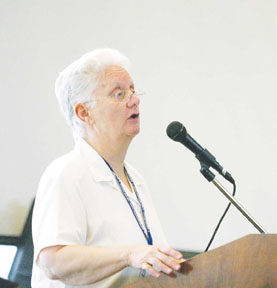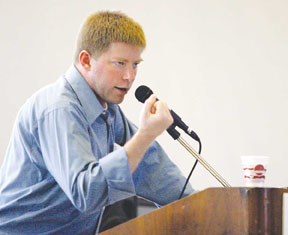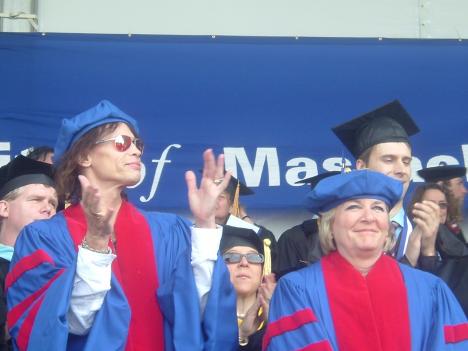UMB Hosts Statewide Conference on the Future of Work in Massachusetts

Susan Moir, director of the UMass Boston Labor Resource Center.
May 5, 2005
By Joe BuckleyContibuting Writer
We are living through a period of revolutionary change in the workplace. Technology, mergers, and a tightening economy are among the many factors that impact the lives of Massachusetts workers. Fortunately, there are many bright, motivated individuals who are striving to improve the worker’s lot.
A statewide, day-long conference on the Future of Work in Massachusetts was held on April 28, 2005 at the Campus Center at UMass Boston. The event began with a few words from Susan Moir, director of the UMass Boston Labor Resource Center. Moir voiced a concern that was heard throughout the day’s workshops and further set the tone for proceeding speakers: the question is not what are the jobs of the future, but what are the good jobs of the future. She explained that good jobs pay a living wage, provide workers with benefits, and leave enough time for employees to meet their family obligations. Interim Chancellor Keith Motley also contributed to the event’s opening remarks.
Mark Brenner, assistant research professor at the Political Economy Research Institute at the UMass Amherst, gave a talk based on his paper, The Massachusetts Economy: the Growing Divide with Uneven Prospects. Brenner pointed out that the so-called “new economy” is fragile. He noted that the core of this new economy is low wage, no benefit work-and that union density has fallen. Brenner said there is a need to address the low wage, service sector employment positions and to find out what we need to do to make our present jobs into good ones. He compared today’s service sector jobs with manufacturing jobs in the early 20th century. At that time, manufacturing jobs were poor paying, low status, and frequently dangerous forms of work until labor organization and worker solidarity lead to improvements in wages and working conditions.
Rocio Saenz, the second speaker and president of Service Employees International Union (SEIU), local 615, spoke about the real-life concerns of Massachusetts workers. She noted that workers want to be able to support a family, as well as the chance to be positive influences in their homes and communities. She, like Brenner and many others, focused on ways to make these things possible and to improve the Commonwealth’s existing jobs, like what happened with the janitor’s strike of 2002 that brought insurance benefits to many part-time employees-an example of workers improving their lives through membership in a labor organization.
The morning’s activities, “Five Concurrent Morning Workshops Reporting on UMass Research on the Future of Work,” provided a foundation for what was to follow. The workshop titles included “Women, People of Color, and Immigrants in Massachusetts Workplaces,” and “Massachusetts in the Global Economy: Production Shifts, Outsourcing, and Deindustrialization.”
The workshops centered around UMass’ research on timely, social, and economical issues. For example, “The Women, People of Color, and Immigrants in Massachusetts Workplaces” workshop featured presentations by Xiagang Deng, Lening Zhang, Tom Juravich, and Marlene Kim. Each of the speakers provided brief presentations that were interesting and informative, and will also be included in an upcoming book. Marlene Kim of UMass Boston’s department of economics presented “The Future of Low-Paid Work for Women in Massachusetts,” in which she examined the difficult realities that many of our fellow citizens face up to every day.
“Twenty percent of women in Massachusetts earn low wages. These women are more likely to be of color, non-citizens, immigrants, less educated, and younger.” Ms. Kim’s findings are significant and carry with them social, economic, and moral implications, as do the other researchers whose work was presented that day.
When the afternoon’s workshops were over the conference attendees were entertained by Reflect and Strengthen, a group of talented young women who create culturally relevant performances. Walnut, a thoughtful poet, performer, and activist, also added to the conference’s afternoon component.
As the afternoon drew to a close a summary of the days work was given along with reports and a period of discussion. Robert Haynes, the president of the Massachusetts AFL-CIO was the closing speaker.
The event was well received. Dana Huyser, a woman from Western Massachusetts, said, “I am here presenting a paper for the book. I’m also learning more about labor and work. I’m getting my feet wet.”
The papers that were read at the conference will be included in a book titled The Future of Work in Massachusetts, which will be published by the University of Massachusetts Press.






















































